

Learn from urban logistics insights, experience, and Living Labs demonstrations in Europe and beyond. Best practices and resource repository are valuable reference for individuals or organizations seeking to improve their knowledge on urban logistics. Here stakeholders can access proven approaches, tools, templates, case studies, and other resources to inform their decision-making and implementation efforts, ultimately fostering continuous improvement and innovation.
|
|
Data is a key source of competitive advantage, but only if shared securely and sovereignly. The IDS Reference Architecture Model (IDS-RAM) sets standards for trusted data sharing ecosystems, enabling smart products and innovative services. As the core of the International Data Spaces (IDS) concept, it defines key components, interactions, and governing principles for data space architectures. Developed collaboratively by companies, scientists, technologists, and policymakers, the IDS-RAM is the conceptual framework for designing and implementing data spaces.Link to the full IDS-RAM 4.0
Link to the IDS-RAM 4.0 repository |
|---|
 |
The Rulebook of the International Data Spaces Association (IDSA) provides functional, technical, operational, and legal requirements for building and operating data spaces based on the IDS-RAM , outlining mandatory and optional functionalities for various implementation approaches. It's designed for data space participants, data sharing initiatives, and anyone interested in data sharing standards or setting up data spaces, allowing them to assess alignment with the requirements IDSA suggests for trustworthy data spaces trustworthy data space . The Rulebook is accessible to readers with diverse backgrounds, not just lawyers or software engineers.Click on the IDSA Rulebook to learn more about the resourceFind the full IDSA Rulebook on GitBook |
|---|
 |
The Dataspace Protocol is a standardized set of rules developled and designed by the International Data Spaces Association (IDSA) to enable seamless and trusted data sharing within data spaces, similar to how HTTP works for web data. It promotes interoperability by defining schemas and protocols for key functions like data cataloging, contract negotiation, and usage agreements. By adhering to this protocol, organizations can align with industry standards, adopt best practices, and unlock new data-driven business models.Click on Dataspace Protocol to open the resource.Find a user-friendly version of the Dataspace Protocol on IDSA’s Knowledge Base |
|---|
 |
The open-source International Data Spaces (IDS) Reference Testbed reference testbed allows companies and organizations to develop and test data space components. The testbed helps them to build components that comply with the International Data Spaces (IDS) standard and then test them on their interoperability and prepare them for their IDS certification. This is crucial for enabling a data economy based on data sovereignty and trusted data sharing within data spaces, as the testbed facilitates the widespread adoption of necessary IDS components. |
|---|
 |
The Roadmap for Sustainable Urban Freight in ASEAN provides a strategic framework designed to help ASEAN cities transition toward more sustainable, resilient, and efficient urban freight systems. The roadmap is structured into three key phases—short, medium, and long-term—allowing cities to implement actions progressively based on their specific capacities, challenges, and goals. The methodology behind the roadmap involves a phased approach, ensuring that cities can build a solid foundation before moving toward more complex interventions. The actions proposed in the roadmap are based on a thorough analysis of regional challenges and opportunities, incorporating insights from research, stakeholder engagement, and private sector input.This strategic roadmap provides a clear direction for ASEAN cities to address their urban freight challenges while promoting sustainable development aligned with broader regional and global goals. By addressing the specific challenges and leveraging the opportunities inherent in the ASEAN context, these guidelines pave the way for sustainable changes in urban freight and logistics management across the region.Link to the pdf |
|---|
 |
BOOSTLOG Vision is transforming European freight transport and logistics R&I ecosystem to perform optimally boosting impact generation out of R&I investment contributing to |
|---|
Shenzhen, recognized as the inaugural city worldwide to implement zero-emission freight zones in 2018, established 10 "green logistic zones." These zones permit all-day access for electric freight vehicles under 4.5 tonnes while banning fossil fuel freight vehicles entirely. By the end of 2019, Shenzhen boasted over 70,000 battery-electric freight vehicles in operation, surpassing the number of electric buses and taxis, marking the city as home to the largest operational electric fleet. |
|---|
Confluence, spanning 1.5 km² in Lyon, aims to create a tranquil, low-motorized environment while enhancing public space utilization. The district's massive urban construction challenges traditional automotive mobility and logistics flows. |
|---|
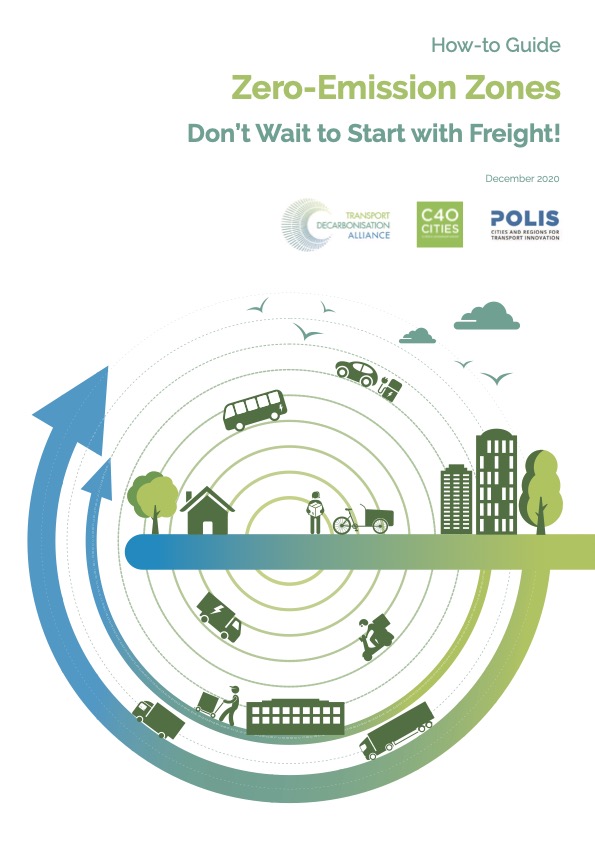 |
Logistics professionals have faced increased demand and challenges but have maintained the supply, earning appreciation for their dedication. Despite progress, there's still a significant distance to cover in achieving green freight objectives, emphasizing the need for prompt action. The overarching goal of the Transport Decarbonisation Alliance is to foster global cooperation towards greener transport, with this guide serving to support partners by sharing experiences and promoting the potential of zero-emission freight. Through this guide "Don’t wait to start with freight" the intention is to extend support to these partners by sharing the experiences of ZEZ-F pioneers and highlighting the vast potential of zero-emission freight.Link to the pdf |
|---|
 |
As the fight against climate change intensifies, Urban Vehicle Access Regulations (UVARs) are gaining popularity for their potential to reduce emissions and enhance air quality. UVARs encompass measures such as Low Emission Zones, Traffic Limited Zones, Pedestrianisations, and Parking Regulations. However, their implementation often faces challenges due to their broad impact beyond geographical boundaries, affecting factors like accessibility, social inclusion, and affordability. While the UVAR SUMP Topic guide published in 2019 provides valuable insights, further guidance is needed, especially regarding stakeholder engagement, complementing measures, and information for tourists. Projects like Dynaxibility4CE produced additional guidance documents and tools, including an annex elaborating on UVAR implementation considering Functional Urban Areas (FUAs).Link to the pdf |
|---|
 |
Across Europe, local authorities are addressing this air and noise pollution, congestion and safety issues by implementing Urban Vehicle Access Regulations (UVARs), which prioritize sustainable mobility and restrict vehicle access in urban areas, particularly private cars, to create more livable cities focused on people rather than cars. UVARs encompass measures like Low Emission Zones, congestion charges, Limited Traffic Zones, and alterations to road layouts. Accordingly, this document presents the insights of the six cities (Bielefeld, Helmond, Jerusalem, City of London, Padova and Vitoria-Gasteiz) integrated UVARs into their standard urban mobility strategies within The Horizon 2020 project ReVeAL (2019-2022) context.Link to the pdf |
|---|
 |
Recent years have witnessed rapid growth in ride-hailing and ride-sharing, advancements in powertrain technologies, and the deployment of connected cars, with the imminent arrival of autonomous vehicles. The integration of multi-modal trip planning is becoming increasingly feasible, reflecting consumer preferences for convenient and sustainable mobility options. To facilitate this change effectively, a shared digital framework is necessary to aggregate data from various sources, offering real-time insights into the urban environment and this report adopts a comprehensive perspective, examining how the principles of mobility data sharing can address the constraints faced by various stakeholders such as governments, businesses, and citizens.Link to the pdf |
|---|
 |
Through a combination of innovative technology solutions, collaborative schemes driven by the sharing economy, and policy interventions, ULaaDS seeks to catalyze systemic changes in urban and peri-urban service infrastructure, aligning with sustainable urban mobility plans (SUMPs). ULaaDS endeavours to accelerate the deployment of shared and zero-emission solutions to meet the challenges posed by the growing on-demand economy in urban logistics. Followingly, this document emphasizes the factors that drive adoption, barriers to implementation, and essential components for successful pilot and trial implementations in the context of Sustainable Urban Mobility Plans (SUMP) or Sustainable Urban Logistics Plans (SULP) development.Link to the pdf |
|---|
 |
ULaaDS (Urban Logistics as an on-Demand Service) aims to revolutionize urban logistics by fostering sustainable and livable cities through the re-localization of logistics activities and the restructuring of freight flows. Through a blend of innovative technology solutions, collaborative sharing economy initiatives, and policy interventions, this ULaaDS policy paper aims is to underscore practical insights from trials, including the optimization of urban space allocation, engagement of stakeholders for success, promotion of fair competition in freight transport, and understanding the technological solutions. These insights were collaboratively compiled by ULaaDS partners representing seven ULaaDS cities.Link to the pdf |
|---|
 |
The Alliance for Logistic Innovation and Collaboration in Europe (ALICE) has developed the "Towards Zero Emissions Logistics 2050" roadmap to provide practical guidance for companies and stakeholders in achieving decarbonization goals. The roadmap emphasizes the need for collaboration and efficiency gains in freight transport and logistics, focusing on leveraging existing assets, integrating flows, and maximizing capacity utilization. The document offers an overview of existing roadmaps, a framework for decarbonization, and specific actions for stakeholders to undertake individually or collectively to facilitate the transition towards sustainable freight management.Link to the pdf |
|---|
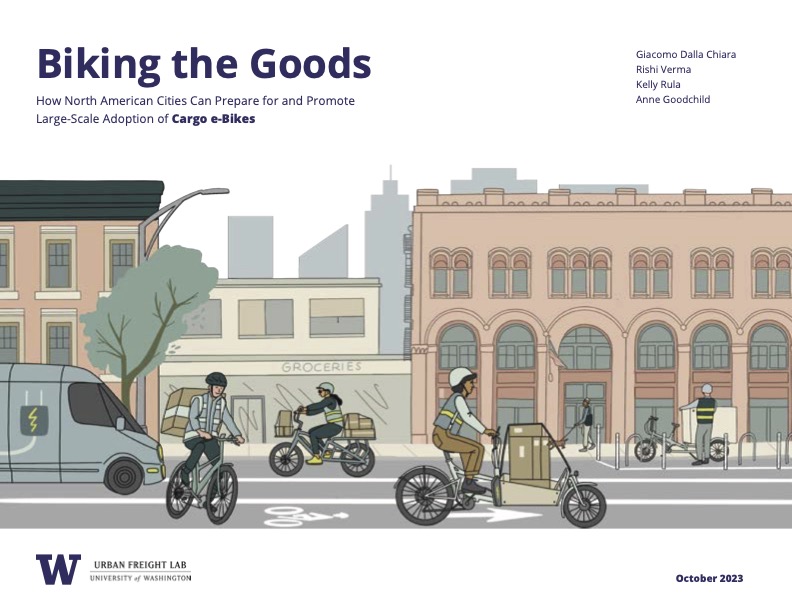 |
This paper provides insights for urban planners regarding cargo e-bikes, outlining successful deployments in North America as replacements for ICE vehicles and proposing strategies to promote their adoption while ensuring safety for all road users. Drawing from data and opinions of key stakeholders in the public and private sectors, and leveraging the expertise of the Urban Freight Lab, the paper offers nine recommendations and 21 actionable strategies across four thematic areas: culture and education, infrastructure, policy and regulation, and incentives. covering topics including labour force training, cycling infrastructure, e-bike laws, and purchase incentives.Link to the pdf |
|---|
 |
Parcel lockers have rapidly emerged as a popular innovation in cities, outpacing the development of associated policies and regulations, prompting public authorities to seek ways to manage their proliferation while mitigating potential impacts on public spaces and traffic. The City of Groningen, in collaboration with the University of Groningen and Bax & Company have developed a framework for an open parcel locker system, involving interdepartmental collaboration, stakeholder engagement, academic studies, benchmarking of international practices, and spatial analysis for optimal placement. In this paper, the focus is on ten specific locations identified for their significant potential to improve accessibility in densely populated areas of the city.Link to the pdf |
|---|
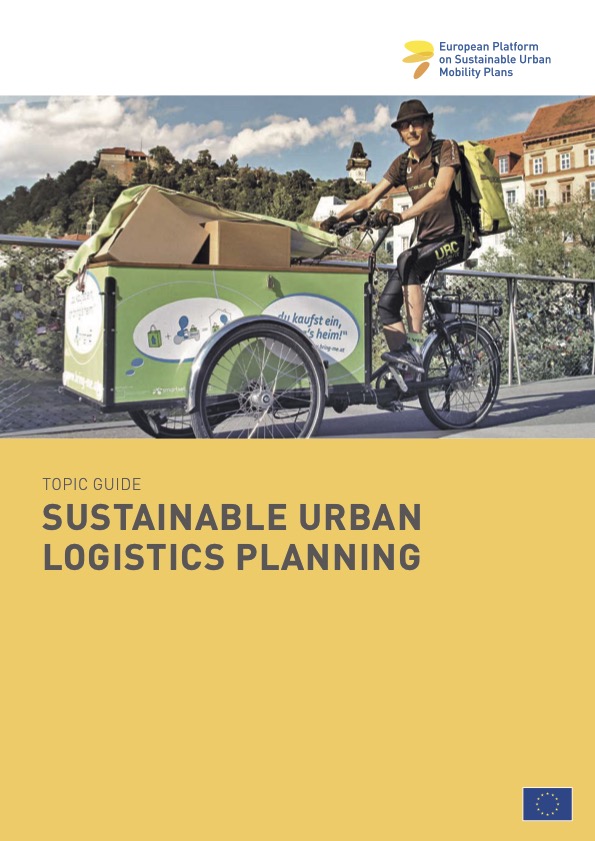 |
Aligning with the framework outlined in the European Commission's Urban Mobility Package and the European SUMP Guidelines (second edition), the Sustainable Urban Logistics Planning (SULP) guide aims to furnish authorities with a structured approach to implementing actions within the SUMP context, effectively addressing challenges and achieving sustainable urban logistics policy and planning. By integrating best practices of tools, methods, and techniques applicable across various stages of the revised SUMP process, along with measures and interventions, the guide aims to provide practical assistance to readers in realizing the future sustainability objectives of their cities.Link to the pdf |
|---|
 |
This collaborative guide represents a joint effort between POLIS, the network of European cities and regions dedicated to transport innovation, and ALICE. Its purpose is to consolidate the perspectives of various stakeholders and experts, offering guidance to local and regional authorities, national and EU governments, companies, civil society, and citizens. By providing a framework for organizations to align their agendas with the objectives outlined in the document, it calls for collective action and collaboration, recognizing that no single stakeholder can effectively address the challenges alone. The guide seeks to unite diverse stakeholders and experts to contribute to the advancement of sustainable and livable urban environments.Link to the pdf |
|---|
 |
The evolution of logistics real estate tailored to professionals and considerate of urban requirements has emerged as a viable solution, facilitating mobility optimization and hastening the decarbonization of distribution operations. This handbook exemplifies the ongoing tension between various scales, functionalities, and divergent perspectives among stakeholders. The key challenge lies in reframing the perspective: does real estate cater to the logistics needs of the city, or do logistics operators shape their operations based on available real estate? To what extent can urban logistics be planned or guided to serve the interests of territories and their inhabitants? This guide reflects the dynamic interplay between urban development and logistical demands.Link to the pdf |
|---|
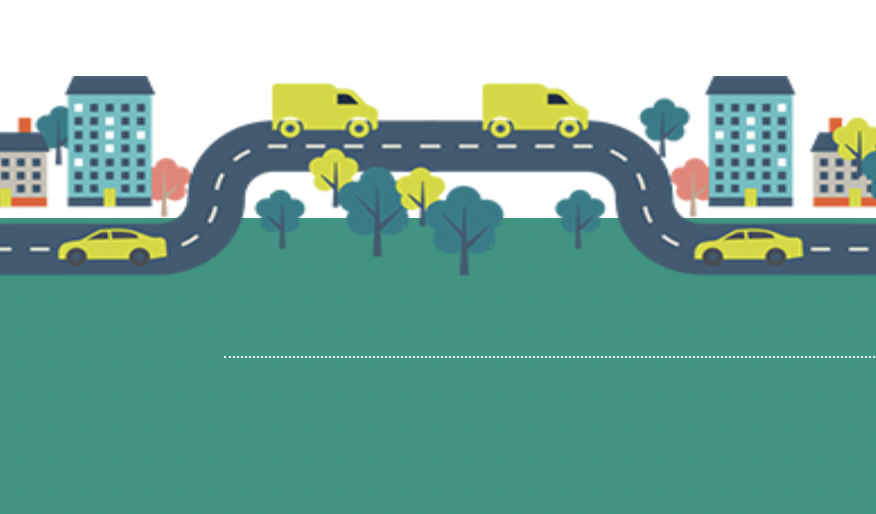 |
The Novelog Toolkit is a user-friendly tool designed to assist users in identifying city logistics measures and their impacts based on selected parameters. Users can choose relevant parameters and press "search" to view a list of measures and impacts implemented in cities with similar parameters. The toolkit allows users to explore the impacts of specific measures by selecting them and pressing the "search" button. Information regarding the implementation location, timing, and impacts of the chosen measure is provided. Users can further refine their search by selecting specific city parameters.Link to Tool kit |
|---|
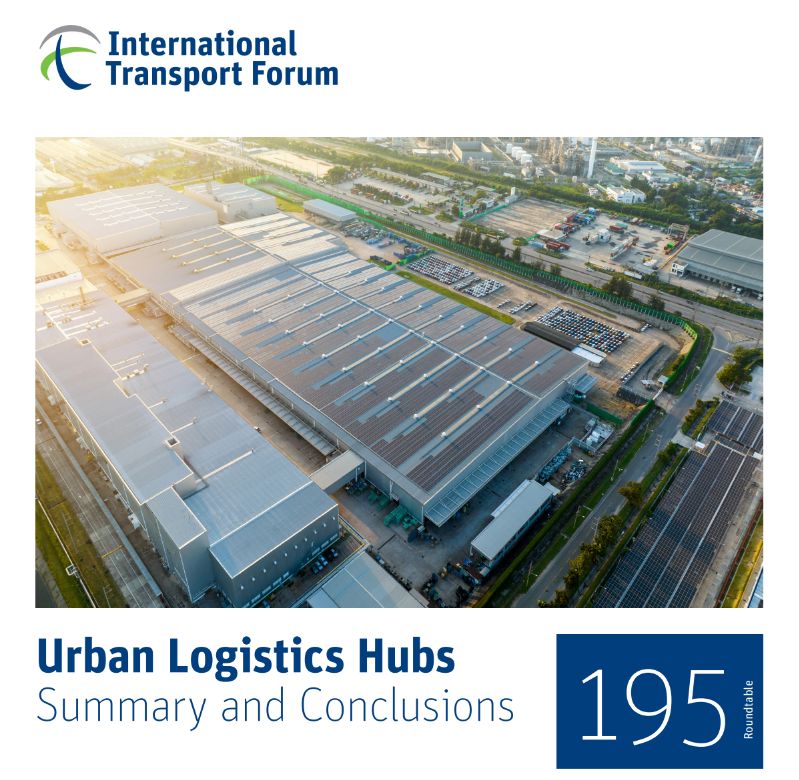 |
This report provides targeted advice to policy makers on proactive measures to manage the complexities of urban logistics and facilitate the uptake and success of urban logistics hubs. The report expands on the expert discussions during the International Transport Forum (ITF) Roundtable, “Urban Logistics Hubs”, held in Paris and by video conference on 26–27 June 2023. Laetitia Dablanc (Université Gustave Eiffel, Paris) chaired the Roundtable discussions.Link to the pdf |
|---|
 |
On February 18, 2025, the final event of the PILL and SYTADEL projects in Brussels showcased advancements in the Physical Internet (PI) and synchromodal logistics. PILL developed a PI blueprint and software stack, while SYTADEL focused on creating a Flemish logistics data space for synchromodal transport. Key takeaways included discussions on Flemish logistics innovation, technical advancements, industry perspectives on synchromodality, and ALICE's contributions. ALICE highlighted the alignment of PI with zero-emission logistics goals and the need for collaboration, standardization, and asset sharing. Breakout sessions explored technical and business aspects, emphasizing the importance of industry collaboration, governance, and scalable solutions for wider adoption. The event highlighted that synchromodal transport and PI are moving from theory to reality, requiring continued collaborative effort.Link to the website |
|---|
 |
This discussion paper by ALICE addresses inefficiencies in logistics stemming from fragmented data, paper processes, and system silos, proposing a new level of data synchronization. It argues against relying solely on disparate government or monolithic industry platforms and instead advocates for a peer-to-peer data sharing model where owners retain control. The core proposal involves two components: a common high-level language (ontology) to provide a universal semantic layer for logistics operations, leveraging existing standards, and the adoption of modern, secure communication protocols (based on W3C standards) for real-time data exchange. A proof-of-concept by GEODIS demonstrated the feasibility of this approach for synchronizing processes across partners. The paper concludes by urging logisticians to actively engage in defining these open standards to avoid future fragmentation and ensure interoperability, suggesting the creation of a dedicated Logistics Data Space.Link to the pdf |
|---|
The European Union is implementing the Electronic Freight Transport Information (eFTI) Regulation to digitalize freight transport across all modes, aiming for a fully paperless system by July 2027. This initiative is projected to yield significant benefits, including reduced administrative burdens, enhanced data security, improved logistical efficiency, and substantial cost savings for the transport and logistics sector, while also contributing to sustainability goals. Key challenges for successful implementation include IT system development, ensuring cybersecurity, and securing widespread adoption, particularly among SMEs, necessitating strong collaboration between stakeholders and proper resourcingLink to the website |
|---|
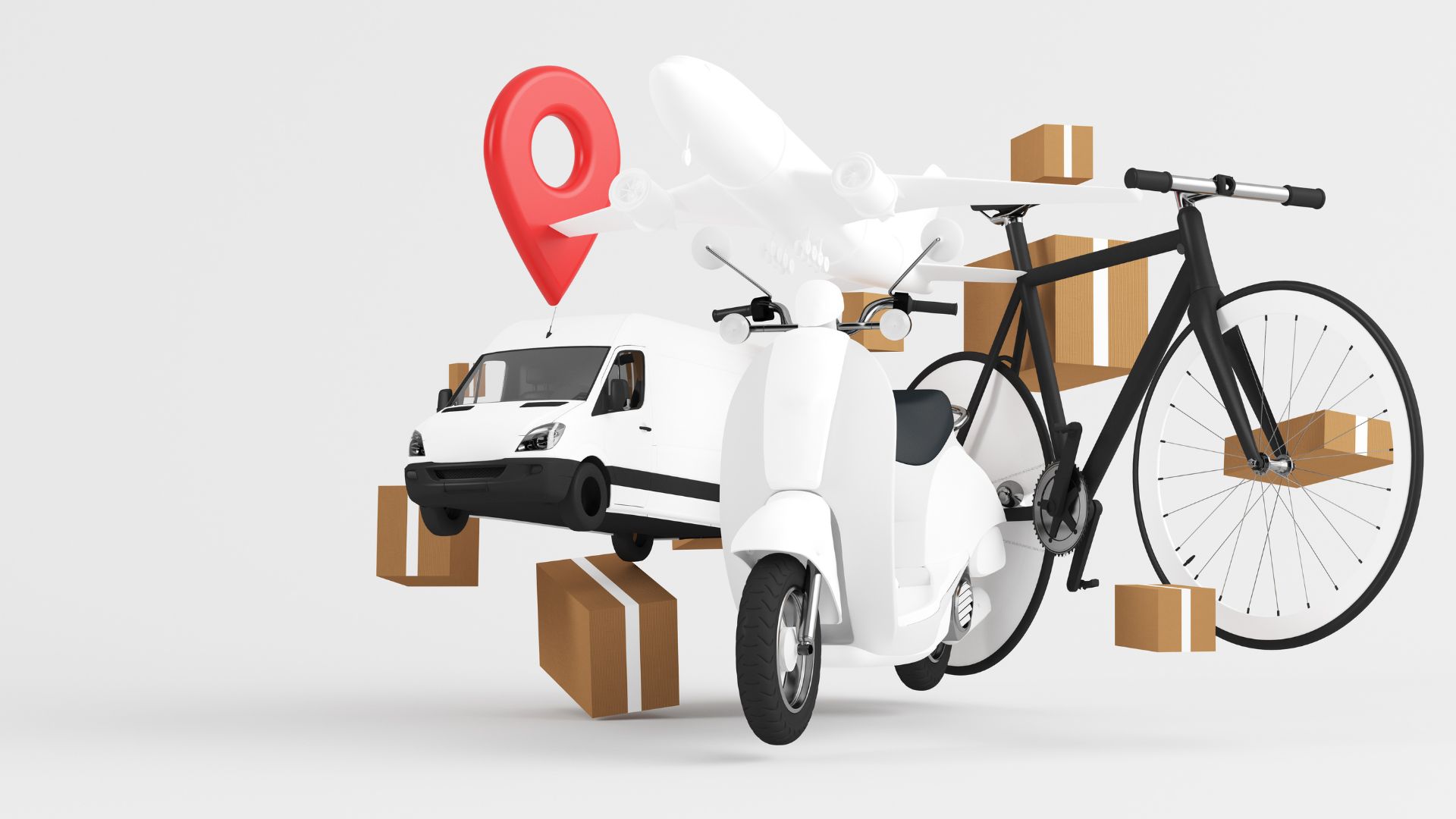 |
The ongoing 2023-2026 GRETA project is tackling the challenge of greening last-mile freight in seven Central European cities – Bologna, Helsinki, Lyon, Maribor, Poznan, and Reggio Emilia. They're testing cool ideas like zero-emission vehicles, local microhubs, and smarter street management. While Bologna, Helsinki, and Lyon are already rolling out their plans (think microhubs and a central hub in Lyon), Maribor, Poznan, and Reggio Emilia are still in the planning stages, likely focusing on microhubs too. To learn from others and share ideas, GRETA has also set up a regular meeting group with similar projects, with workshops happening roughly every three months to dive deep into specific urban logistics topics. Ultimately, GRETA's work promises to make a real difference in creating more sustainable city deliveriesLink to the website |
|---|
 |
The European Commission's Expert Group on Urban Mobility (EGUM) recommends several key actions for Sustainable Urban Logistics Plans (SULPs), including establishing an EU-wide approach for data collection and sharing, updating SULP guidelines to incorporate new elements and innovations, providing expert support to local authorities, setting national policies for worker safety and collaborative logistics, strengthening public-private partnerships, and encouraging sustainable e-commerce practices, all aimed at optimizing urban goods transportation for environmental and efficiency benefits.Link to the pdf |
|---|
 |
This document, "Recommendations on Urban Logistics - Mobility and Transport," by the European Commission's Expert Group for Urban Mobility, focuses on the critical role of data sharing in optimizing urban logistics. It highlights the challenges and mutual benefits for both public and private sectors in sharing data to improve decision-making, performance measurement, and long-term urban planning. The recommendations emphasize voluntary data sharing and the use of simple IT tools by cities to collect and share data, ultimately aiming for more sustainable and efficient urban freight transport through better data access and digitalization of relevant regulations and assets.Link to the pdf |
|---|
 |
The document "EGUM Recommendations SG4 D3 InnovationUptake" offers guidelines on enhancing urban logistics through innovation to decrease emissions amid rising demand, providing specific recommendations for local authorities to use regulations and incentives, establish testing environments, engage in research, and optimize urban planning; for private stakeholders to embrace innovation through participation, feedback, sustainable practices, and infrastructure support; and for member states to utilize funds, revise laws, offer guidance, and support the deployment of clean vehicles and micro-hubsLink to the pdf |
|---|
|
|
This deliverable presents the analysis conducted to define the technical infrastructure requirements necessary for the deployEMDS project. Leveraging frameworks from the Open Data Product Specification (ODPS) and the Data Space Business Alliance (DSBA) Technical Convergence document, a bottom-up approach was adopted to address the diverse requirements of the nine implementation sites. This methodology emphasised a capability-driven design to establish a scalable, secure, and flexible data space, ready to meet the evolving needs of the European mobility sector. Through an intake and mapping process, the essential technical, functional, and operational capabilities required by the data space to support use cases at various implementation sites were identified. This included specifying components such as data governance mechanisms, authentication, authorisation, and accounting protocols, along with interoperability standards crucial for the efficient management and exchange of mobility data. Additionally, requirements stemming from best practices and state of the art were added to reach the minimum viable capabilities for the data space. This process did not result in requirements for a specific data space standard, indicating that the methodology and results are implementation-agnostic. This supports a later decision that should be based on a hands-on feasibility study.For more information, click here to access the Full Report. |
|---|
|
|
This technical report presents the outcomes of Task 2.2 of the deployEMDS project, which focuses on specifying the data space architecture and building blocks in line with the European Data Spaces technical framework. As part of Work Package 2, "Deployment of an operational data space across borders", this task builds on the project’s use case requirements and defines the business processes needed for a functional data space to be deployed. To support the selection of the most suitable technical foundation for the deployEMDS architecture, the project team developed a comprehensive methodology. This approach involved translating use case requirements into customer journeys and related business processes, mapping them to essential data space building blocks, and evaluating existing software stacks. The work is conceptually grounded in the Data Space Blueprint developed by the DSSC, which outlines key organisational and technical building blocks for data spaces. Three software stacks were analysed:• Eclipse Data Space Components (EDC) – a mature, industry-driven open-source initiative offering a reference implementation of a data space connector and the underlying Data Space Protocol• FIWARE Data Space Connector – an implementation developed by the FIWARE Foundation to connect FIWARE-based technologies to data spaces• Simpl – a European Commission-driven open-source initiative to support the implementation of Common European Data SpacesFor more Information, click here to access the full report |
|---|
|
|
Urban logistics plays a critical role in sustaining the economic and social life of European cities, yet it remains one of the most complex and least efficient areas of transport. To support the transition towards cleaner, smarter, and more sustainable mobility, the European Commission launched a targeted survey on urban logistics across 21 major European urban areas. This study represents the first comprehensive and systematic effort to collect harmonised data on freight deliveries in cities, examining fleet composition, business models, vehicle technologies, and operational practices.The results provide valuable insights into current urban freight patterns, highlight challenges such as emissions, congestion, and data fragmentation, and identify opportunities for collaboration, innovation, and low-emission logistics solutions. Serving as a baseline for future research, the study offers practical evidence to guide city authorities, planners, and policymakers in developing Sustainable Urban Logistics Plans (SULPs) and in advancing the objectives of the European Green Deal and the Sustainable and Smart Mobility Strategy.The report is available in English and French, and you can access it from here |
|---|
|
|
Urban freight is at the heart of Europe’s decarbonization challenge, with growing demand for efficient delivery services often clashing with sustainability goals. This presentation explores the new setting and prospects of the urban freight market, highlighting how ALICE contributes to shaping solutions that reduce emissions, foster collaboration among stakeholders, and support European cities in their transition toward cleaner, more resilient logistics systems.For more Information, you can click here |
|---|
|
|
Urban logistics is increasingly challenged by e-commerce growth, congested streets, and conflicting demands for curb space. This presentation explores how curbside management can be transformed through data-driven, collaborative governance to support more efficient, equitable, and decarbonized urban freight operations. It highlights how shared digital platforms, flexible curb allocations, and integrated stakeholder frameworks align with the Physical Internet paradigm, offering new pathways for European cities to meet sustainability goals while better serving businesses, citizens, and logistics providers.For more Information, you can click here |
|---|